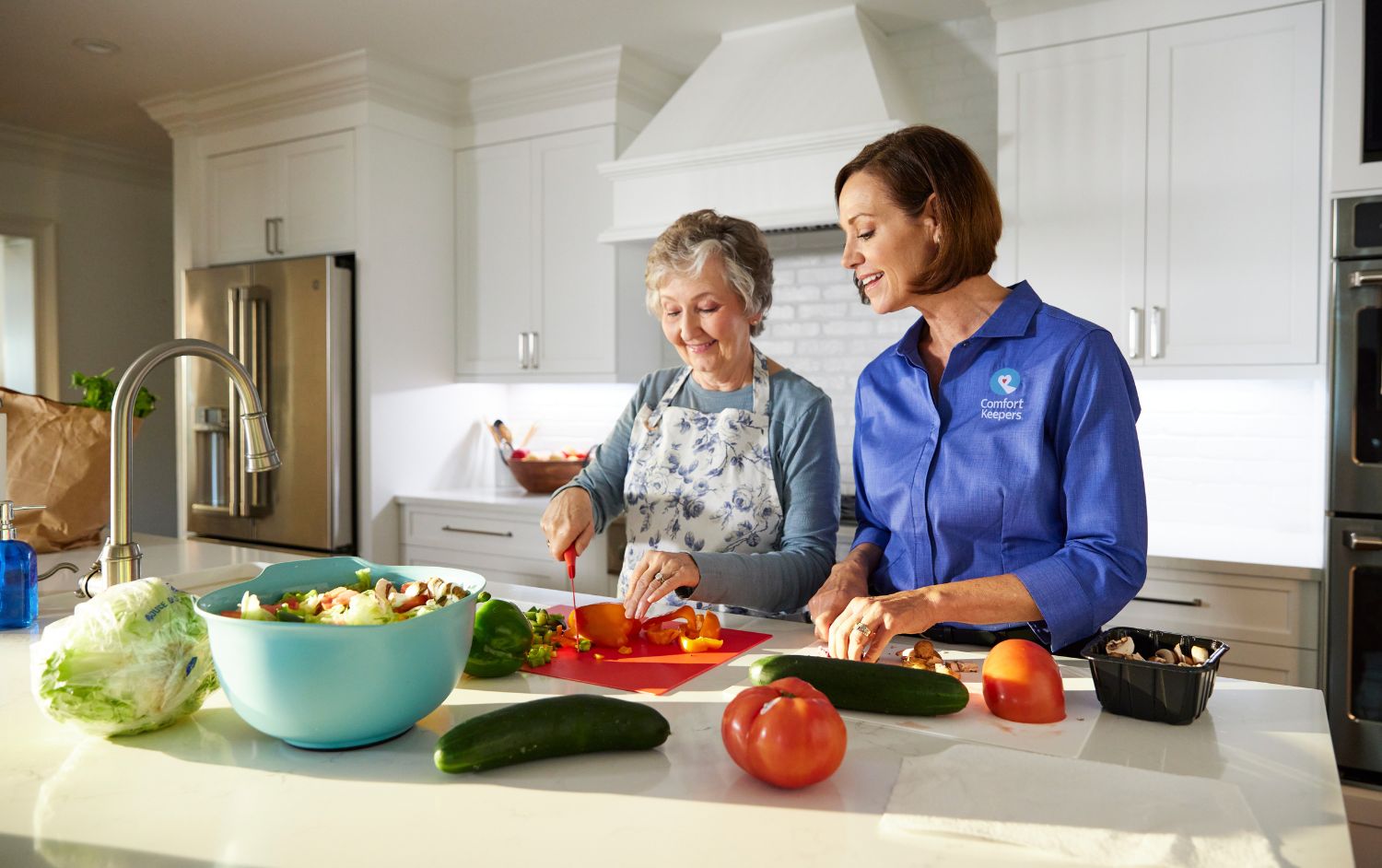That Gut Feeling: 7 Subtle Signs Your Elderly Parent Might Need More Help at Home
TriCities Senior Homecare | August 25, 2025
It’s rarely a single, dramatic event. More often, it’s a quiet feeling that settles in over time. It’s the brief hesitation you notice in your dad’s voice on the phone, the slightly-too-old milk you find in your mom’s fridge during a visit, or a new pile of unopened mail on the counter.
You might brush it off at first. “Everyone gets a little forgetful,” you tell yourself. But the feeling persists. This is the experience for countless adult children who begin to sense a shift in their parents’ well-being. Your intuition is powerful, and it’s telling you to pay closer attention. This guide is here to help you understand what you might be seeing, separating normal aging from the subtle signs that more support may be needed.
Normal Aging vs. Gentle Warnings: Understanding the Difference
Growing older brings inevitable changes. It’s normal for your parent to take a bit longer to recall a name, to prefer a quiet night in over a loud party, or to have a few more aches and pains. These are typically gradual adjustments.
The warning signs we’re exploring here are different. They often appear as a pattern of small, uncharacteristic changes that disrupt daily life. It’s the difference between occasionally misplacing car keys and repeatedly forgetting what the keys are for. The key is to look for a cluster of changes that suggest a new struggle with everyday tasks.
The 7 Subtle Signs an Elderly Parent Needs Help at Home
Let’s explore the quiet indicators that often go unnoticed. For each one, we’ll look at what it is, what it could mean, and how you can observe it with compassion.
1. The Quietly Changing Kitchen
What it looks like: You notice multiple containers of the same food item, like four jars of mustard. You find food well past its expiration date. The fridge is either nearly empty or packed with spoiling leftovers. Your parent may have unexplained weight loss or gain, or they might be eating the same simple meal (like toast and tea) every day.
What it could mean: This isn’t just about being a “picky eater.” It can signal a range of issues:
- Physical Fatigue: Grocery shopping and cooking can become exhausting.
- Cognitive Decline: They may forget what they already have, how to cook a familiar recipe, or even that they haven’t eaten.
- Loss of Smell/Taste: This common age-related change can make food unappealing, leading to poor nutrition.
- Depression: A lack of motivation can directly impact the energy needed to prepare healthy meals.
Observation Tip: Instead of asking, “Are you eating okay?” try a more collaborative approach. Say, “I was thinking of trying a new recipe this week, would you like to make it with me?” or “Let’s go through the fridge together and make a grocery list.” This turns an interrogation into a shared activity.
2. Shifts in Personal Care and Appearance
What it looks like: Your parent, who was always so put-together, is now wearing stained clothes or the same outfit for several days. You notice changes in personal hygiene, like unkempt hair, body odour, or neglected dental care. Laundry is piling up, and the home isn’t as tidy as it used to be.
What it could mean: This is rarely about “letting themselves go.” It often points to a deeper challenge.
- Mobility Issues: Difficulty getting in and out of the shower or fear of falling can lead to avoidance.
- Depression or Apathy: A decline in mental health can sap the energy and desire for self-care.
- Cognitive Difficulties: They may lose track of when they last bathed or forget the steps involved in doing laundry.
Observation Tip: Look for the “why.” If laundry is piling up, is it because the machine is in a difficult-to-reach basement? If hygiene is slipping, is it related to a fear of the bathroom? Understanding the root cause is crucial before seeking solutions like personal care support.

3. A New Hesitation in Their Step
What it looks like: You see small, unexplained bruises on their arms or legs. They seem to “furniture-walk,” using walls and furniture for support as they move around the house. They are newly hesitant to use stairs or walk on uneven ground.
What it could mean: While a fall is a major event, the fear of falling is a powerful and subtle predecessor.
- Muscle Weakness or Balance Issues: Age-related changes can make them feel unsteady on their feet.
- Vision Problems: Difficulty with depth perception can make navigating their own home a challenge.
- Medication Side Effects: Dizziness is a common side effect of many prescriptions.
Observation Tip: Pay attention to their footwear. Are they wearing old, unsupportive slippers? Watch how they get up from a chair. Do they need to push off with significant effort? These small details can reveal a lot about their mobility and safety.
4. The Muddled Calendar and Missed Dates
What it looks like: Your parent starts missing important appointments, like doctor’s visits or long-standing social engagements. They seem confused about the day of the week or the time of day. You might hear them repeat stories or ask the same questions within a short period.
What it could mean: This goes beyond simple forgetfulness. It can be an early indicator of cognitive challenges.
- Mild Cognitive Impairment (MCI): An intermediate stage between normal age-related cognitive decline and more serious dementia.
- Early-Stage Dementia: Difficulty with short-term memory and executive function (planning and organizing) are hallmark signs.
- Overwhelm: They may simply have too much to manage, and their system for tracking things is no longer working.
Observation Tip: Look at the calendar on their wall. Is it up to date? Check the prescription bottles. Are the pills being taken on schedule? These are tangible clues that can help you understand if they are struggling to manage their schedule. For families navigating these challenges, specialized dementia and Alzheimer’s care can provide essential support.
5. A Fading Interest in Joy
What it looks like: Hobbies that once brought joy – gardening, book club, weekly card games – are now abandoned. Your parent withdraws socially, making excuses to avoid seeing friends or family. There’s a general sense of flatness or apathy that wasn’t there before.
What it could mean: Social withdrawal is a significant red flag that should never be dismissed as just “slowing down.”
- Depression: This is one of the most common causes and is highly treatable.
- Hearing or Vision Loss: Social situations can become frustrating and isolating if they can’t follow the conversation or see faces clearly.
- Insecurity or Fear: They may be afraid of “slowing others down” or embarrassed by a new physical or cognitive limitation.
Observation Tip: Ask about their friends. A question like, “I haven’t heard you mention Carol lately, how is she doing?” can open the door to a conversation about why they aren’t connecting anymore. Sometimes, all that’s needed is a little encouragement and support, which is the heart of companionship services.
6. The Overlooked Mail and Finances
What it looks like: You find a stack of unopened mail, including bills or important letters. You see late payment notices or calls from creditors. Your parent may seem unusually secretive or stressed about money, or they might fall for a scam or make uncharacteristically poor financial decisions.
What it could mean: Managing finances requires a high level of executive function, which can be one of the first cognitive skills to decline.
- Cognitive Strain: The multi-step process of opening mail, understanding bills, writing cheques, and mailing them can become overwhelming.
- Vision Problems: They may simply be unable to read the fine print on bills and statements.
- Denial: They may be aware they are struggling but are too proud or afraid to ask for help.
Observation Tip: Offer to help in a low-pressure way. “Mom, tax season is coming up. Can I help you get your papers organized?” This frames it as a shared, normal task rather than an accusation of incompetence.
7. A Change in Their Familiar Mood
What it looks like: Your easy-going dad is now consistently irritable or angry. Your cheerful mom seems anxious or fearful for no clear reason. You notice a personality change that feels out of character and persistent.
What it could mean: Abrupt and lasting mood changes are often tied to underlying issues.
- Chronic Pain: Living with constant discomfort can understandably lead to irritability.
- Fear and Anxiety: Worrying about their health, safety, or independence can manifest as a changed disposition.
- Cognitive Changes: Some forms of dementia can present first as personality or mood shifts.
Observation Tip: Try to connect the mood change to specific situations. Do they get more irritable when it’s time to leave the house? More anxious at night? Identifying triggers can provide valuable clues to the root cause.
From Observation to Conversation: A Compassionate Roadmap
Noticing these signs is the first step. The next – talking about it – can feel like the hardest. It’s a delicate conversation that requires empathy, patience, and a plan. The goal isn’t to take over, but to open a dialogue about how they can continue living safely and happily.
Start by ruling out any treatable medical causes with their doctor. A urinary tract infection (UTI), for example, can cause sudden confusion in seniors. Once medical issues are addressed, you can approach the conversation with more clarity. A helpful framework is the “40-70 Rule,” a proactive concept suggesting that adult children around age 40 should start having gentle, forward-looking conversations with their parents, who are often around age 70, about their wishes for the future—long before a crisis hits.
What Comes Next? Building a Support System
One of the biggest misconceptions is that “needing help” means an immediate, total loss of independence. This is simply not true. Support exists on a wide spectrum, from simple services that make life easier to more comprehensive care. The goal is to add just the right amount of support to maintain independence, not take it away.
Help might look like:
- A meal delivery service to ensure good nutrition.
- Hiring a housekeeper for heavy cleaning.
- Arranging for a companion to visit a few times a week for social engagement and errands.
- Implementing an in-home care plan that assists with daily activities while fostering engagement through an Interactive Caregiving™ approach.
The first step is understanding what is truly needed. A free in-home consultation can be an invaluable, no-pressure way to have an expert assess the situation and discuss options that respect your parent’s dignity and goals.
Frequently Asked Questions
Q1. How do I start the conversation without making them feel attacked?
A: Use “I” statements and focus on your feelings and observations. Instead of “You’re not eating right,” try “I worry when I think about you having to do all the grocery shopping and cooking alone. I was wondering if we could find a way to make it easier.”
Q2. What if my parent completely refuses help?
A: This is very common. The key is patience. Start small. Suggest a solution to a single, specific problem rather than a total overhaul. Sometimes, it takes multiple conversations. If you’re concerned about their immediate safety, it may be time to consult a geriatric care manager or their doctor for guidance.
Q3. Does needing help automatically mean they have to leave their home?
A: Absolutely not. The vast majority of seniors want to age in place, and a primary goal of in-home care is to make that possible. With the right support system, from companionship to personal care, seniors can continue to live safe, happy, and independent lives in the comfort of their own homes. Exploring our services at Comfort Keepers Tricities can show you the wide range of options available.
Comfort Keepers Tri-Cities Can Help with Signs an Elderly Parent Needs Help at Home
If you have that gut feeling, don’t ignore it. Trust your instincts. The journey begins not with a confrontation, but with compassionate observation and a desire to understand. By noticing these subtle signs, you are taking the first and most important step in ensuring your parent has the support they need to thrive.
The Best, Expert Senior Home Care in Tri-Cities, British Columbia is Comfort Keepers® Coquitlam
At Comfort Keepers®, we provide personalized, compassionate in-home care services for seniors in Tri-Cities of Coquitlam, Port Coquitlam (PoCo), Port Moody, Anmore, and Belcarra, BC.
We proudly support thousands of families each year with home health care services—helping loved ones remain safe, happy, and independent in the homes they love.
Elderly Care at Home: Home is The Best Place to Be
Providing care for an aging parent or loved one can be both fulfilling and incredibly demanding, especially for family members balancing careers and busy households. That’s where we come in.
Comfort Keepers® Tri-Cities offers professional, flexible care solutions that lighten the load for families and give everyone peace of mind—knowing their loved one is in good hands.
We offer a range of services that include companionship care for seniors, personal care services, non-medical homecare and Tri-Cities respite care.
Comfort Keepers® Tri-Cities Can Help with Companion Care and Interactive Caregiving™
At Comfort Keepers® Coquitlam, we believe in more than just meeting physical needs. The team at Comfort Keepers® elevates the human spirit. Trained caregivers build meaningful relationships, bring joy into everyday moments, and provide support that goes beyond routine care.
Our senior homecare caregivers help provide our elderly clients with personal home care to help maintain the highest possible quality of life. Caregivers deliver Interactive Caregiving™, a system of care that addresses safety, nutrition, mind, body, and activities of daily living (ADLs).
Comfort Keepers® Tri-Cities Provides Home Care and a Wide Range of In-Home Care Services for Seniors.
Are you looking for reliable home care in the Tri-Cities of Coquitlam, Port Coquitlam (PoCo), Port Moody, Anmore, and Belcarra?
Learn more about our unique service, which offers personal care, companionship care, palliative and end-of-life care.
Contact the Comfort Keepers® Coquitlam office today to schedule a free in-home consultation. Let us show you how our care can make a meaningful difference in your loved one’s life.
Individualized Home Care Options
Long-Term Home Care, 24 Hour Home Care & Short Term Care Options Customized for You






